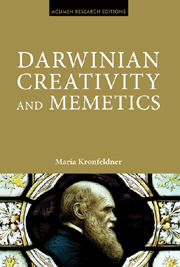3 - The origin of novelty
Summary
THE PATTERN OF CHANGE IN CULTURE
The origination analogy
Culture evidently changes over time. The question of whether it changes in a Darwinian manner or not can be approached in two different ways. First, is culture a variational system, with selection as a necessary part of the change? Second, is variation blind, does it arise in an undirected way as assumed for biological evolution? In other words, are the factors involved in the generation of novelty and those involved in selection decoupled as in biological evolution or coupled, exhibiting a Lamarckian correlation? And is the correlation partial or even total, as in a Lamarckian instructive mechanism? As explained in Chapter 2, even if a system is variational, it can nonetheless include coupling. Thus, the two questions have to be addressed separately.
I shall start with a detailed description of how the origin of novelty in culture can be approached independently of Darwinian thinking. I shall then briefly address the gradual and variational nature of culture. Both aspects are uncontroversial and usually not cited as justification for the Darwinian approach to creativity. Most of this chapter is then dedicated to a detailed analysis of the second question about blind variation in creativity. In contrast to the first, this one has caused considerable controversy over the past fifty years. The arguments have gone back and forth without much progress. I shall lead the way through these back and forth arguments and provide a new solution.
- Type
- Chapter
- Information
- Darwinian Creativity and Memetics , pp. 35 - 52Publisher: Acumen PublishingPrint publication year: 2011



